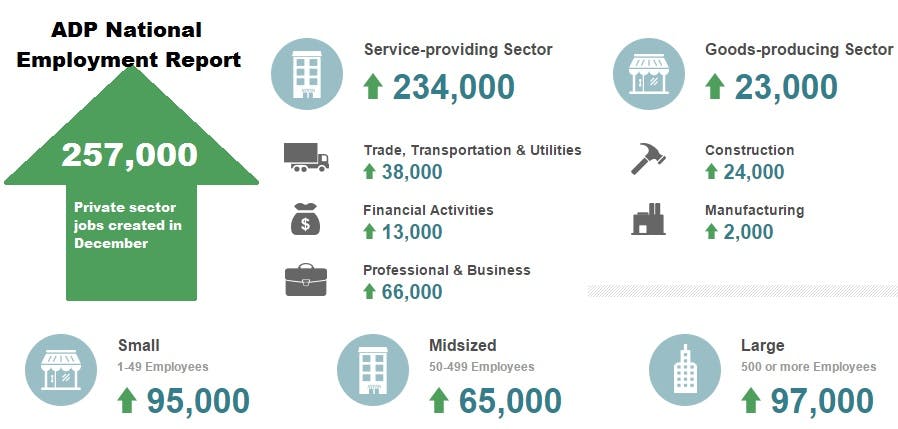Private employers added a record 257,000 jobs in December, far above the 192,000 predicted by labor economists and raising expectations that the government’s numbers to be released Friday will be similarly robust.
This morning’s National Employment report from HR services company ADP showed hiring by private sector employers was the strongest since December 2014, with the biggest gains coming almost equally from large and small employers alike.
“Strong job growth shows no signs of abating,” observed Mark Zandi, chief economist of Moody’s Analytics, which partners with ADP in producing the report. “The only industry shedding jobs is energy. If this pace of job growth is sustained, which seems likely, the economy will be back to full employment by mid year.”
Although the ADP report rarely tracks closely with the monthly employment report produced by the U.S. government’s Bureau of Labor Statistics, it’s closely watched by analysts for clues to what the official report may show. The consensus is that Friday’s official report will show about 215,000 total new jobs, with the private sector contributing some 200,000.
According to ADP, the strongest job gains — 66,000 — came from the professional and business services sector, which includes accounting, legal, computer and management services, and temporary staffing. Trade, transportation, and utilities, which includes all retail, added 38,000 jobs during the month. Other sector gains were:
- Construction +24,000
- Financial activities +13,000
- Manufacturing +2,000.
Despite the strong job numbers, a pair of other reports strike a more cautionary note. The Conference Board’s count of jobs posted online declined precipitously in December, dropping by 276,800 jobs from the previous month. Typically, December’s new job postings are among the fewest of the year, last month’s decline is the sharpest of any month since January 2009.
A second report from The Conference Board says CEO confidence in the economy declined in the fourth quarter to a reading of 45. According to the Conference Board, readings below 50 means more CEOs are pessimistic than optimistic.
Consumers, on the other hand, were more confident about the future. After taking a sharp decline in November, The Conference Board’s Consumer Confidence Index rose in December to 96.5.
“Consumers’ assessment of the current state of the economy remains positive, particularly their assessment of the job market,” said Lynn Franco, director of economic indicators. “Looking ahead to 2016, consumers are expecting little change in both business conditions and the labor market. Expectations regarding their financial outlook are mixed, but the optimists continue to outweigh the pessimists.”
